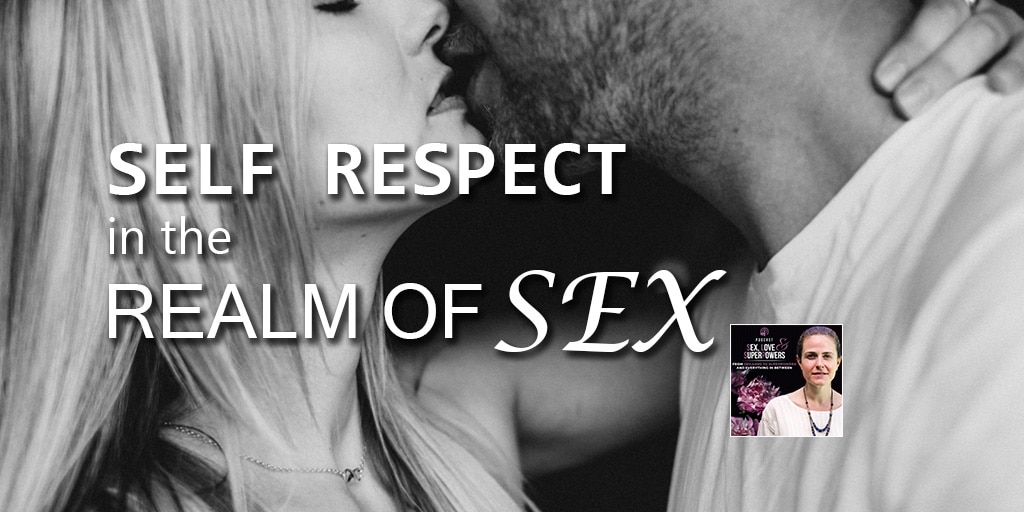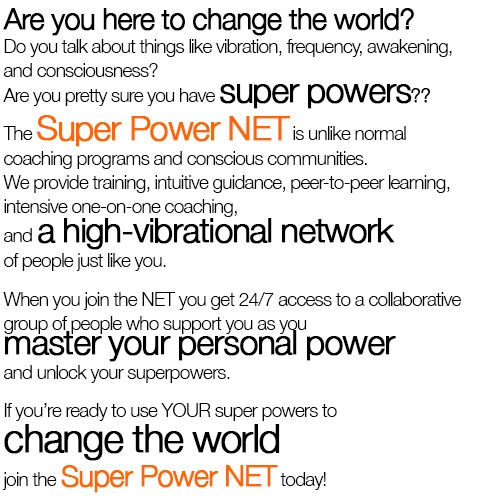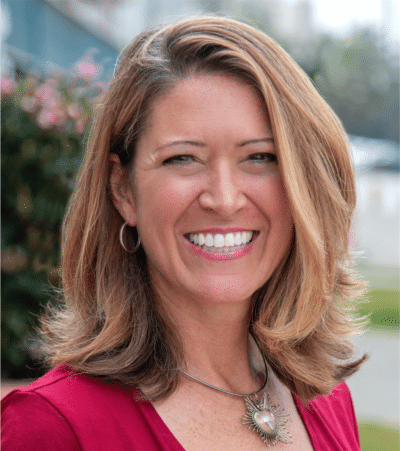
Hello, everyone. Welcome to the Sex, Love and SuperPowers Podcast Show. I am your host, Tatiana Berindei. I am so delighted for our guest, Dr. Jennifer Gunsaullus. Today, we are going to be talking about self respect in the realm of sex, which is a very broad topic on purpose so that we can travel many different roads within that topic. Let me tell you a little bit about Dr. Jenn, and you will have a pretty good guess as to why I chose such a broad topic after I intro her here.
Dr. Jennifer Gunsaullus is a sociologist and intimacy coach and a national speaker on couples intimacy, sexual consent, women’s empowerment, gendered communication, erotic play, and mindful sex. She has presented two TEDx Talks, is the co-host of the podcast, Sex Talk with Clint and the Doc. Her first book, From Madness to Mindfulness: Reinventing Sex for Women, will be out and about by the time this interview is live on air.
Woo hoo.
Yeah. Yay for her first book being published.
Thank you.
Dr Jenn has over one and a half million hits on her In the Den with Dr. Jenn YouTube video series and is an expert in the documentary on masturbation called Sticky: A Self Love Story, which I would love to see that documentary because it sounds great.
It’s very, very entertaining.
I bet. Welcome to the show.
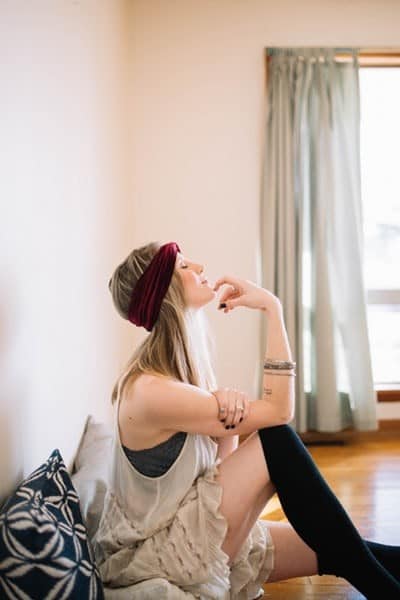
I could feel what’s beneath not expressing it.
Thank you. I’m excited to be here. I’m excited to see what path this conversation goes, what journey we’ll be on.
Me, too. I never know where it’s going to go. Before we start, will you tell our listeners what your superpowers are, please?
Yeah, I love this question. I’ve had so been thinking about it the past couple of days. Think I first realized my real superpower when I first … I do coaching with individuals and couples, and I really got that going about 12 years ago, and I can remember early on the one time, sitting with a client and they’re explaining something, a story from their past, and I’m listening, and it’s neutral storytelling. I’m just listening to the story, and I started feeling so sad inside. I was like, “Why do I want to cry right now?” I’m like, “There was nothing sad that this person’s saying.” So I just sat with it and noticed it in me and stayed present with them. About a minute later, they started tearing up, and they started sharing. The story took a turn to something that was really sad and really upsetting. I was like, “Whoa, that was crazy that I felt that.” It was in them. They were feeling it, but not overtly expressing it yet, but then I was able to pick up on it.
Like
Yeah. I’m like, “Okay, there’s sadness beneath the story because now I know. Now I can use that to my advantage and be really attuned to folks and be like, “Okay, I know what’s going on,” or I could feel what’s beneath not expressing it. It’s super helpful also in my relationships because I’ve had some boyfriends early on be like, “Oh, my God.” They’re like, “How can you tell?” I’m like, “Oh, are you feeling this in this spot, in your solar plexus and whatever?” They’re like, “Yeah, that’s totally where I feel that.”
Wow.
I was like, “Whoa, that’s really uncomfortable. No wonder you’re unhappy with this. I wouldn’t be either.” That’s really rough to sit with and breathe through it. Think incredibly validating to others. I mean, because we are, we’re alone in these bodies, but to know that we really can be so attuned to ourselves and to others that we literally can feel what other people are feeling, I think it’s a really beautiful way to bridge that gap that we’re never really alone that way. We really are all in this together.
I love that lens on it. Is this something that you feel like you had when you were younger, too, or is it something you woke up to as you become an adult?
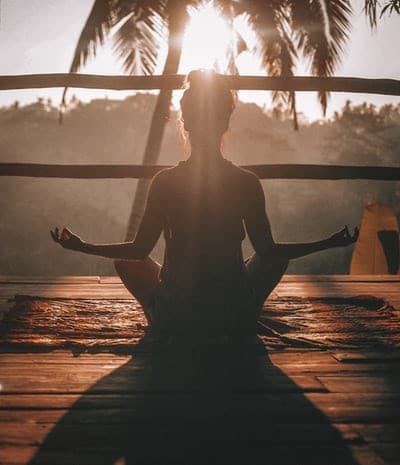
There was no specific awakening, but certainly the cultivation of it through developing mindfulness skills.
I think it’s always been there in terms of my ability to read others, and then it’s just been more attuned. I mean, from practicing mindfulness for 15 years and practicing what I preach and meditation and all different aspects of it, but specifically mindfulness of really get attuned what’s happening in my body, in my thoughts, with my emotions in any given moment, and being able to attune to others in that way. The self practice of mindfulness for 15 years, of having my private practice with clients, but this is something that I have some big memories of just walking through spaces as a kid and just, I don’t know, feeling like I could, in retrospect, probably read things or feel things in people that other people didn’t necessarily, but it’s just how my understanding of how I move through the world and who I trust and who I don’t. There was no specific awakening, but certainly the cultivation of it through developing mindfulness skills.
I think so, for sure. I mean, that’s part of what we teach over here at Super Power Experts too, is how to be in enough awareness of one’s self, and then kinds of superpowers do, they start to come online in a bigger way when we have that understanding of self regulation, but just a relationship like that.
How did you get into the world of sex? I always say, “It’s not the thing on the guidance counselor list of career choices.”
It’s most definitely not an option. It’s so funny because with my first book coming out, I just had a call with my mom. I’m super close to my parents, and I’m in San Diego, but they’re back in Pennsylvania. My mom just asked me that on the phone the other night because she keeps talking to all of her friends about my book coming out. Then they’ve been asking, “How did she get the sex field?” So my mom’s like, “How did you get the sex field? How did you end up on this path?” It was so cute. That’s what I told her. I go, “Oh, this is like a podcast question I get,” and I’m doing it with my mom. It’s so cute, but I was raised like a good girl in Pennsylvania, in a small town outside Philadelphia. I was raised Catholic. I start my story in this way because being raised “a good girl” comes with a load of things that you’re supposed to follow the rules and prioritize others and sit like a lady and act like a lady, which means not having a strong voice-
Not having any fun.
Exactly. Wearing dresses and then you’re not supposed to climb on the monkey bars. That was never my thing. I was always sporty, and that didn’t really come … My parents didn’t really impose that, but just from society and I think from Catholic values, but when I went to undergrad at Lehigh University in Pennsylvania, my sophomore year, my roommate was a sexual health peer educator. You go around to the dorms, you do condom demonstrations, you talk about safer sex, you talk about negotiation, STDs, STIs and she was having so much fun in the group. I was like, “Okay, that group just looks fun. You get to talk about sex. How cool is that?” but also because you get trained in public speaking skills, how to be comfortable standing in front of a group, let alone talking about one of the most uncomfortable topics there is.
At the time, I hated doing group projects where you have to do an oral presentation in front of the class and even just raising my hand sometimes in classes. I joined because the topic sounded interesting, and I wanted public speaking skills. Then I can remember very quickly just really being intrigued by a lot, recognizing that a lot of approach to sex education was very fear-based in that you show pictures of STDs on people’s genitals and you tell them all these bad things that can happen, and they’d be like, “Oh.” It’d be a Thursday presentation, and they’re like, “Oh, my God, I’m never having sex again,” or “I’m never having it without a condom,” and then you run into them Monday morning after a weekend of drinking, and they’re like, “Yeah, I totally did it again.” I was like, “Okay, this approach clearly isn’t working.”
It’s shame-inducing, too, right?
Yeah, absolutely. Oh, yeah. It’s shame-inducing, it’s fear-based, it’s not empowering, it’s not based on what’s motivating us to want to connect with other human beings in the first place or to experience sexual fun and pleasure and connection and intimacy. That was my introduction to the field, and then when I went to grad school in Albany, New York, there was a sexual health peer educator group there. It was mostly for undergrads, as a graduate student and then went on to help to be an assistant and running that program, also. That was my segue in and then studied sociology and got my PhD in that around sexual health education, targeting adult women, HIV prevention programs. I came into this field through the sexual health realm and the public health perspective, but was quickly integrating it with women’s empowerment and women’s voice and pleasure and a very much more holistic approach to the topic.
Very cool. We’re going to dive into all that stuff when we get back. We do have to take a quick break. Before we go to break, will you tell our listeners where they can go to find out more about you and your work and your book?
Yeah. My main hub is my website, which is drjennsden.com.
Beautiful. We’re talking with Dr. Jennifer Gunsaullus about self-respect in the realm of sex. Much more when we get back. Stay tuned. You don’t want to miss this one.
To listen to the entire show click on the player above or go to the SuperPower Up! podcast on iTunes.
Music Credit: All instruments played by Amanda Turk. Engineered and produced by Tatiana Berindei and Daniel Plane reelcello.com
Podcast: Play in new window
